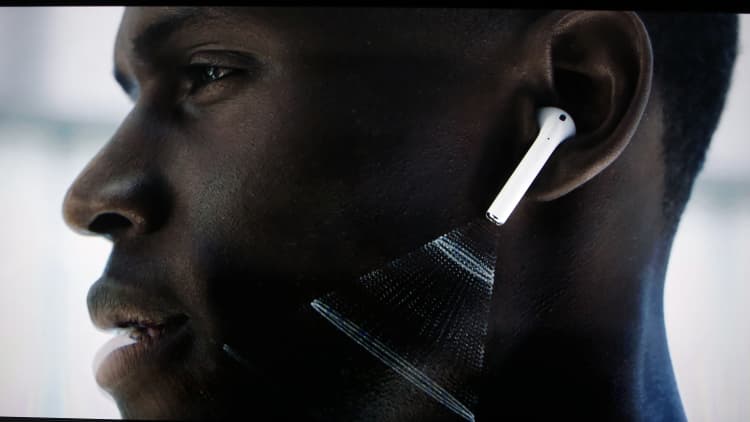Apple is confident it made the right decision to remove the wired headphone jack on the iPhone 7 and launch the wireless AirPods, but it could take some time for the new Apple product innovation to prove to consumers it's ready for prime time in the premium headphone market.
Several audio executives told CNBC the AirPods can't quickly catch up to wired headphones, because of failings in three key attributes — and appearance isn't among them. Power efficiency, audio quality and noise cancellation technology are areas in which the AirPods are limited compared with current top-tier mobile audio options.
Among the new device's flaws is that wireless functionality requires constant recharging, said Mike Culver, president of Danish audio company Libratone, which is launching Lightning compatible earbuds next month. (The AirPods last for five hours per charge and come with a portable charging case that can provide more than 24 hours of battery life.)
AirPods also lack the ability to produce high-resolution audio quality, said Dunja LaRosa, director and head of mobile audio at Sony Electronics. LaRosa said the future is likely in wireless, but technology hasn't progressed enough to put the cord to rest and achieve high-resolution audio.
"In general, we do see the market going for wireless or Bluetooth devices more over the last couple years," said LaRosa. "But the majority of the market right now still comes from wired solutions."

In the world of premium headphones, audio executives mentioned the lack of active noise cancellation as a major drawback. "Adjustable noise cancellation is pretty important to customers, because the function of a one-size-fits-all solution is just not correct," said Andreas Sennheiser, co-CEO of German audio manufacturer Sennheiser, along with his brother Daniel Sennheiser.
Sennheiser, along with audio giants like Bose, Sony and Apple-owned Beats, is moving toward technology that allows users to decide how much external noise they let in. If someone is on an airplane, they might choose to block out all ambient noise, while on a city street they might want to hear cars passing by.
Current technology doesn't allow for this type of noise cancellation in wireless earbuds, several audio executives said. The power source needed for the feature can't fit into the tiny devices, so it either requires a cord or an external battery pack. That leaves the market at a crossroads: wireless earbuds without noise cancellation, or wired solutions with it.
More from Iconic:
Success secrets from a rags-to-riches Top 5 global billionaire
Tech products that were the next big thing — before they failed miserably
5 business lessons from Amazon's Jeff Bezos
Apple chose what some consider a surprising third option: wireless earbuds without all the bells and whistles.
Many consumers won't mind the trade-off, said Patrick Moorhead, founder and president of global technology advisory firm Moor Insights & Strategy. For the general public, simple wireless setup and functionality is a more important innovation than high-resolution sound quality, he said.
"There are no perfect technologies at first, but compared to most Bluetooth headsets, AirPods are a step ahead," Moorhead wrote in an email.
Apple's senior vice president of worldwide marketing, Phil Schiller, told the audience at Apple's recent product event, "It makes no sense to tether ourselves to cables with our mobile devices."
Apple did not respond to multiple requests for comment.
The AirPods, which will ship in October and cost $159, can be set up at the touch of a button, easier than typical Bluetooth pairing, and have at least one feature that analysts said is unprecedented in the world of Bluetooth headphones — they work across all of a user's devices.
Horace Dediu, founder of market intelligence site Asymco, said even if AirPods' audio can't match that of wired earbuds right now, he expects it to develop quickly. "Products of this nature have an evolution," he said. "They don't stay this way for long. They tend to be improved."
Products of this nature have an evolution. They don't stay this way for long.Horace Dediufounder of market intelligence site Asymco
Other big players in the audio industry are hedging their bets, developing both wireless and wired earbuds. Several are focusing on over-ear headphones, which are less portable but have enough physical space to fit the technology for noise cancellation and wireless functionality.
Bose offers consumers wired earbuds with noise cancellation at $249, while also selling wireless earphones without those features at $149.95, and premium over-ear Bluetooth headphones with noise cancellation for $349.95. Beats sells wireless headphones with adjustable noise cancellation for $379.95 and wireless earbuds without noise-cancelling technology starting at $149.95. Sennheiser offers three modes of noise cancellation in wired earbuds for $229.95, while providing noise cancellation in a wireless headphone option for $399.95.
Traditional wired devices are often more affordable and represent an area of comfort for older customers, LaRosa said. That's why Sony sells simple wired earbuds for as little as $10 alongside its newest noise-canceling Bluetooth headphones for $399.
Even if the technology is young and imperfect, launching AirPods gives Apple first shot at a new market, said Jon Erensen, research director at technology advisory firm Gartner.
"Apple will bring this new product category to the forefront, just like they've done with tablets and watches," Erensen said.
— By Aneri Pattani, special to CNBC.com




